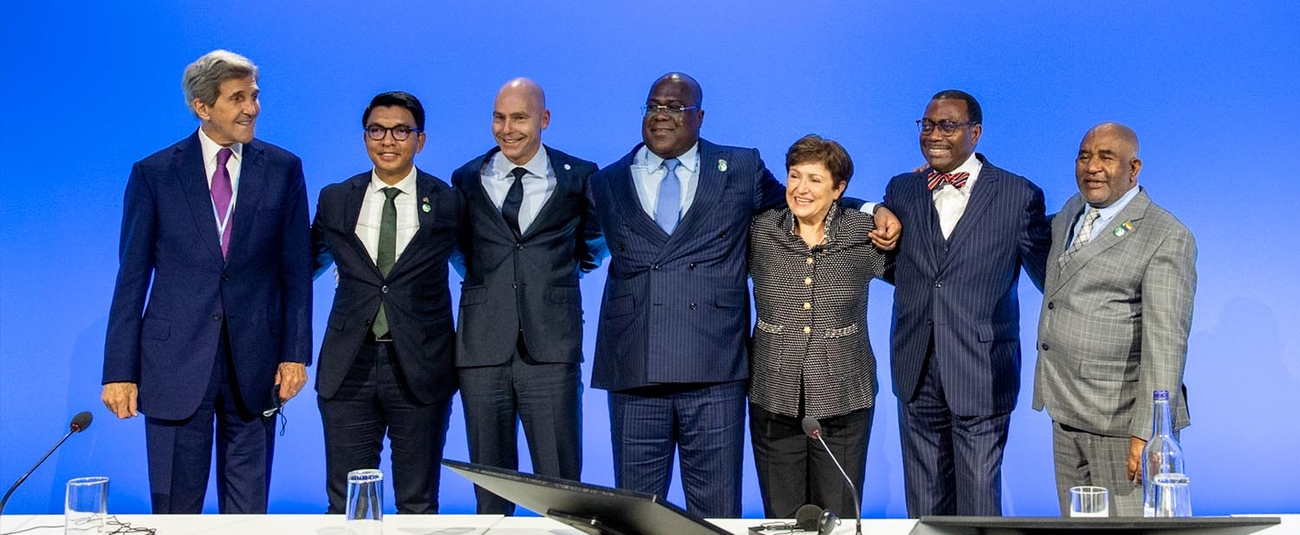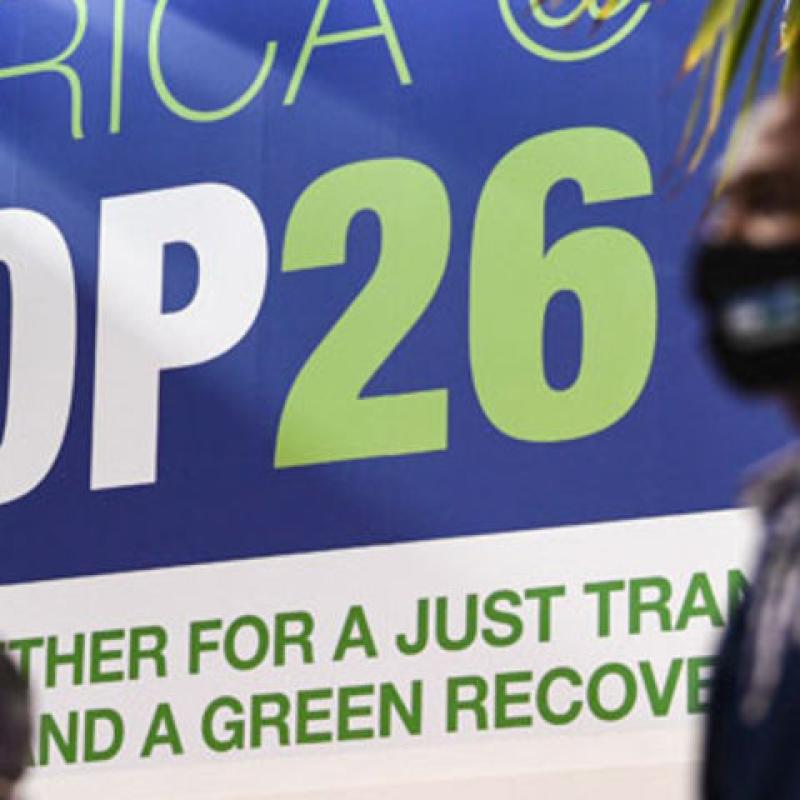
AAAP in the Media
Displaying 1 - 5 of 5
UK gives Africa $197 million to mitigate climate change
Youth Adaptation Solutions Challenge Francophone Cohort
The Youth Adaptation Solutions Challenge is an annual competition and awards program for youth-led enterprises (50% women-led) organized by GCA and AfDB as part of the Youth Adapt Flagship Program.
The competition invites young entrepreneurs and Micro, Small and Medium-sized Enterprises in Africa to submit innovative solutions on climate adaptation and resilience. The winners will be part of a 1-year incubator program, which will provide tailored training on business development and adaptation, coaching, networking opportunities, and grants to enable the youth-led enterprises to scale up their innovative businesses and build resilience among marginalized communities in Africa
The objective of the project is to deliver business development services (BDS) to and build the institutional capacity of youth-led enterprises, positioning them to effectively utilize grants offered and to also mobilize additional private capital, scale up climate action and create employment opportunities on the continent.
- Build youth capacity for employability and unlocking access to finance
- Deliver a 1-year incubator program tailored training on business development and adaptation
- Provide coaching and networking opportunities
- Equip young innovators and MSMEs with customized skills and resources to scale up climate adaptation innovations and boost the creation of jobs
- Grant disbursement to the 5 winners of the YouthADAPT winners
- 12-weeks training with practical skills in entrepreneurship and business development and climate adaptation
- Mentorship to enable the winners to execute their business plans, create jobs, and support the continental effort towards climate resilience
- Training materials developed and training workshops delivered tailored to the selected youth-led start-ups
- Support to the youth led-businesses to develop and implement their business plans and to mainstream adaptation and climate resilience in their businesses
- Delivered business development services (BDS) to and building the institutional capacity of youth-led enterprises
- Youth-led enterprises positioned to effectively utilize grants offered and to also mobilize additional private capital
- Scaled up climate action and ability create employment opportunities on the continent
USD 500 Million
African, other world leaders gather for largest summit on climate adaptation at COP26

African and other global leaders came together at COP26 in Glasgow yesterday for the Africa Adaptation Acceleration Summit, the largest summit to date on climate adaptation.
The summit called for the rest of the world to ramp up its support for the African continent as it adapts to the adverse effects of climate change, including devastating human impacts in Madagascar, where 1.3 million people live under food distress following four years of no rain. Madagascar’s situation has been described as the first climate induced drought.
President Félix Tshisekedi of the Democratic Republic of Congo and Chairperson of the African Union led Tuesday’s event. He highlighted the $6 billion in financial commitments for climate adaptation that African countries had put forward in their nationally determined contributions (NDCs) and called for increased funding to produce the additional $27 billion a year that the continent requires.
President Tshisekedi said: “Adaptation finance flowing to Africa is grossly insufficient compared to the enormous resources needed for the continent to adapt to climate change. That is why African countries, working with the Global Center on Adaptation, the African Development Bank, and other partners, launched the Africa Adaptation Acceleration Program (AAAP). The program lies at the heart of Africa’s climate change needs. It is Africa-owned and Africa-led. African nations have endorsed it as Africa’s preferred mechanism to deploy adaptation finance for adaptation projects in Africa.”
African Development Bank Group President Dr Akinwumi A. Adesina said: “The Africa Adaptation Acceleration Program is a game changer for Africa to deliver results and impacts on adaptation, fast and at scale. It will support 30 million farmers with digital climate advisory services. The Technologies for African Agricultural Transformation program supported by the African Development Bank and the Bill and Melinda Gates Foundation has already delivered climate resilient technologies for 11.2 million farmers in just two years.”
He added: “With the Africa Adaptation Acceleration Program, we expect to reach 40 million farmers. We plan to support farmers in producing 100 million metric tons of food, which will be enough to feed 200 million people and reduce hunger by 80%.”
Moderating summit proceedings, Patrick Verkooijen, CEO of the Global Center on Adaptation, underscored the urgent need for accelerated climate adaptation action across the continent: “COP26 must deliver on the promises of Paris,” he said. “We are failing and we are failing Africa. We must bring more ambition and more finance to help Africa adapt to the pace of a climate emergency devastating the continent with increasingly serious consequences for the world’s poorest and most vulnerable,” the GCA CEO added.
COP26 President Alok Sharma announced $197 million in new funding for adaptation for Africa from the UK government. Of this amount, $27 million will support the Africa Adaptation Accelerated Program upstream facility to deliver technical assistance and a pipeline of bankable projects. The package is expected to unlock almost $1.2 billion for climate adaptation in Africa. Sharma said there will be more to come.
US Secretary of State Antony Blinken also announced new funding for climate adaptation from the United States government. He said the US President would work with the US Congress to dedicate $3 billion annually in adaptation finance by the year 2024. This is the largest commitment ever made by the US to reduce the impact of climate change in those most endangered by it around the world.
Staple Crops Processing Zone (SCPZ): funding proposal to the Green Climate Fund
The target countries of Democratic Republic of the Congo, Ethiopia, Togo and Zambia are regions experiencing high deforestation, poor agriculture yield and increasing poverty exacerbated by climate change. Across all four countries, climate variability and change has become a major threat to sustainable development.
As part of efforts to address these challenges, the four countries are implementing national projects to establish Staple Crops Processing Zones: initiatives designed to concentrate agro-processing activities within areas of high agricultural potential to boost productivity and integrate production, processing and marketing of selected commodities. These initiatives are purposely built shared facilities, to enable agricultural producers, processors, aggregators and distributors to operate in the same vicinity to reduce transaction costs and share business development services for increased productivity and competitiveness.
Developing adequate infrastructure (energy, water, roads, ICT) in rural areas of high agricultural potential should attract investments from private agro-industrialists/entrepreneurs to contribute to the economic and social development of rural areas.
The Staple Crops Processing Zone (SCPZ) development program aims to transform agriculture production in regions experiencing high deforestation, poor agriculture yield and increasing poverty exacerbated by climate change, including the target countries of Democratic Republic of the Congo, Ethiopia, Togo and Zambia.
The specific objectives of SCPZ are: (i) improving access to seed capital through grants and matching grants; (ii) supporting productivity enhancement through introduction of new technologies and agricultural inputs; (iii) improving access to infrastructure by supporting investment; (iv) improving the capacity of producer cooperative through training and TA, especially for targeted women and youth groups; (v) facilitating market linkages throughout-growers’ schemes; and (vi) facilitating on-farm value addition by targeting limited value chains and linking farmers to the supply chain.
GCF financing is sought to strengthen one of the project components of SCPZ in Democratic Republic of the Congo, Ethiopia, Togo and Zambia.
- Through the technical assistance program, AAAPwill accelerate the mobilization of adaptation finance.
- Increased carbon sinks in soil and above-ground biomass
- Reduced carbon dioxide/other greenhouse gas emissions from farms due to efficient energy use
- Increased renewable energy production from biomass, either as a substitute for fossil fuels or as a replacement for burning of fuel wood or crop residues
- Fewer incidents of bare soils, reduced soil erosion and increased water percolation.
- Reduced emissions through low-emission energy access and power generation
- Reduced emissions due to improved waste management, including by recycling waste and use of waste in biogas systems
- Reduction of emissions from land use and deforestation, and enhancement of forest carbon stocks.
-
Increased resilience, including to extreme events such as droughts and floods, and enhanced livelihood of about 55% of highly vulnerable people and communities
-
Increased access to better health and wellbeing, and food and water security to over 100,000 beneficiaries, in addition to provision of alternative sources of energy
-
Increased resilience of ecosystems and ecosystem services in forests and savannas
USD 427 million:
- Funding proposal to GCF seeking USD 174.02 million (USD 130.02 million grant and USD 44 million loan)
- AfDB providing USD 111.2 million (USD 85.2 million loan and USD 26 million grant)
- Co-financiers:
European Union, USD 10.4 million (grant)
BOAD, USD 17.6 million (loan)
Korea Exim Bank, USD 50 million (loan)
Korea Fund, USD 5 million (grant)
Islamic Development Bank, USD 31 million (loan)
Governments of target countries, USD 28 million (counterpart financing)
Reinforcing Resilience to Food and Nutrition Insecurity in the Sahel (P2-P2RS)
The Sahel, which lies between the Sahara Desert to the north and tropical savannas to the south, is one of the largest semi-arid/arid sub-regions globally. As such, the region is highly vulnerable to climate change and other uncertainties. The impacts of climate change may have critical socio-economic consequences for the Sahel, including poor agricultural yields, increased frequency of natural disasters. Already, the number of people in the Sahel suffering from chronic food and nutrition insecurity, poverty and vulnerability to the effects of climate change is rising steadily.
A lasting solution to food and nutrition insecurity in the Sahel requires building resilience to climate change, long-term agricultural sector financing and developing trade and regional integration. Sustained, longer-term investments in household resilience can significantly reduce the cost of emergency assistance, ultimately breaking the cycle of recurring famine. This is the most cost-effective intervention option which meets the basic needs and preserves the dignity of the populations of the Sahel. This idea is central to the Programme to Build Resilience to Food and Nutrition Insecurity in the Sahel (P2RS)
The overall objective of the P2-P2RS is to contribute to the substantial improvement of the living conditions and the food and nutritional security of the populations of the Sahel region.
Specifically, the program aims to i) strengthen the resilience to climate change of agro-sylvo-pastoral producers, including through promotion of climate-smart agricultural technologies in the Sahel and the development of climate intelligent villages; ii) develop the agro-sylvo-pastoral value chains, including through the development and improvement of hydro, meteorology and climate services; and iii) support regional institutions (CILSS, APGMV, CCRS) to strengthen adaptive capacity in the Sahel.
- Design digital adaptation solutions (Digital Climate Advisory Services, DCAS) for the Sahel context
- Investment readiness and infrastructure, institutional and farmer capacity needs for DCAS
- Feasibility study to integrate DCAS into agricultural extension and agrometeorological advisory to smallholder farmers and pastoralists
- 1 million rural households have access to digital or data-enabled climate-smart technologies
- 500,000 smallholders have adopted adaptation practices
- 5 million smallholders have access to climate services;
- Development and improvement of hydro, meteorology and climate services
- The development of climate-intelligent villages
- Promotion of climate-smart agricultural technologies in the Sahel
- Resilience to food and nutrition security built for the targeted populations
USD 300 million

